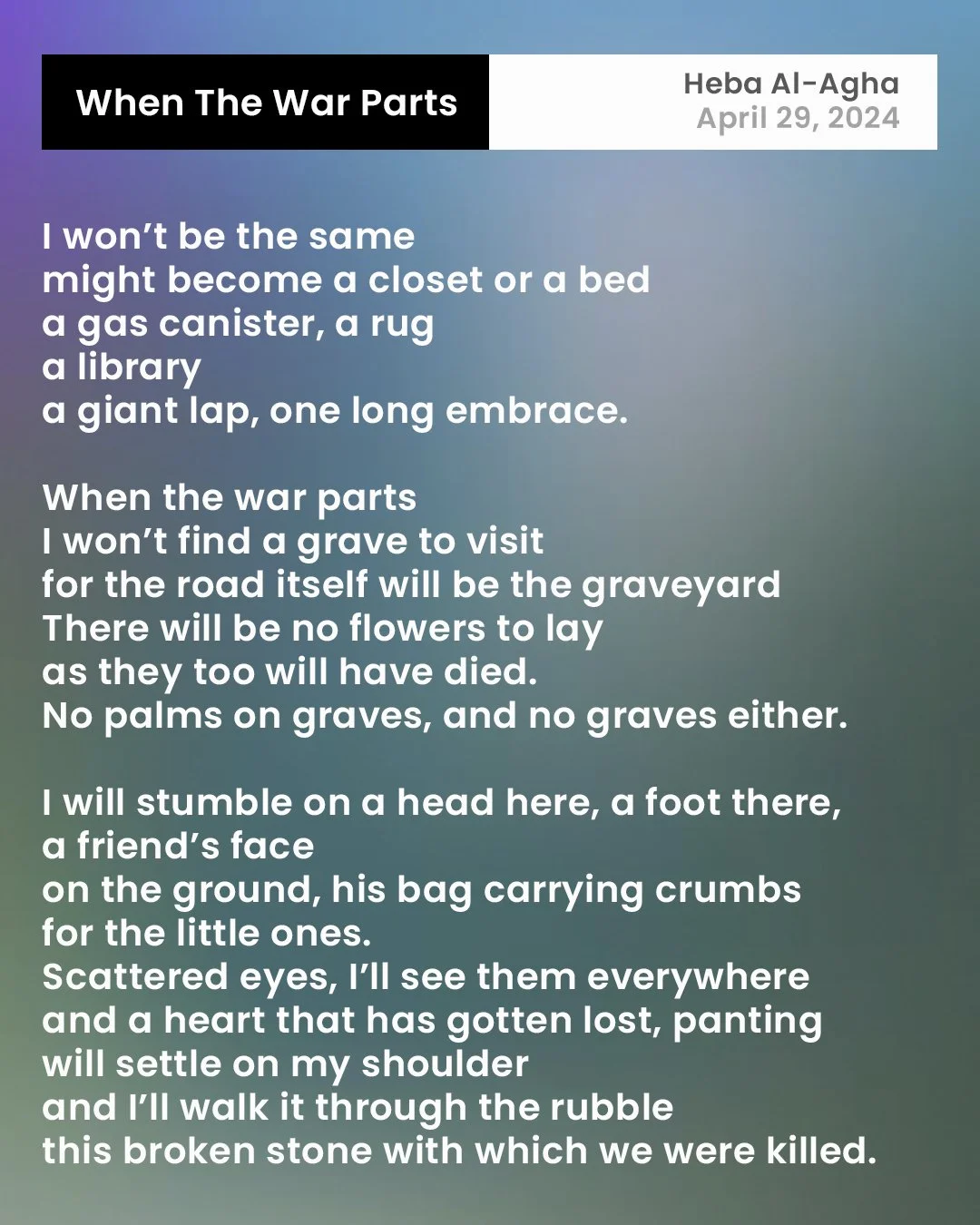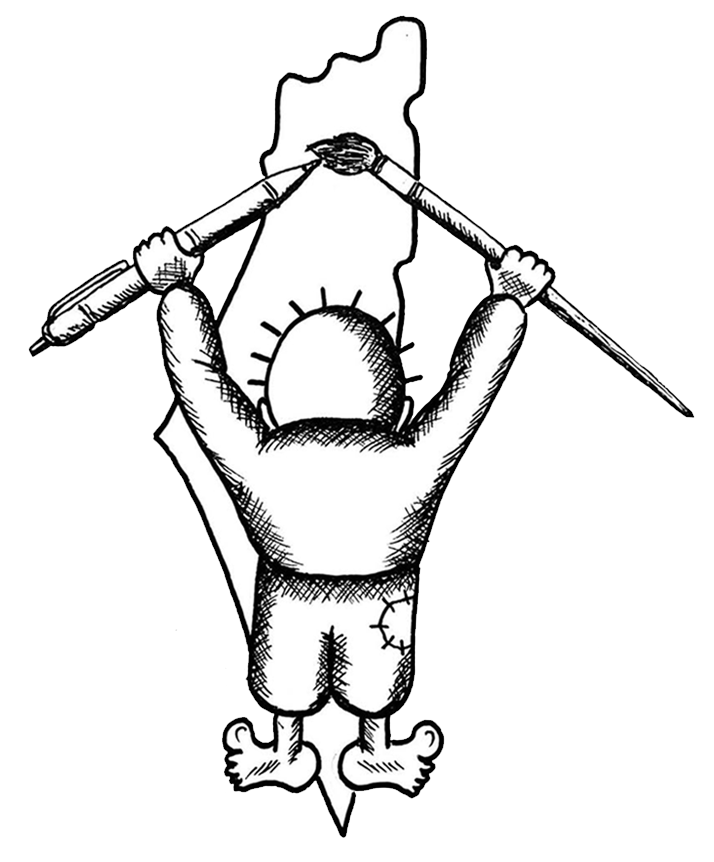Heba Al-Agha
Heba Al-Agha is a writer, poet, and creative writing teacher at the A.M. Qattan Foundation in Gaza City. Her work has been published in outlets such as ArabLit, The Institute for Palestine Studies, and LitHub.
Mentee and student of Heba, Batool Abu Akleen, has said:
“Heba is and will always be my favorite person. She is an incredible woman, instructor, and writer!
When I was a little kid, I used to ask her, ‘Why don’t you publish your own book?’ She would answer, ‘I am raising writers who’ll publish and write wonderful books. You are my output.’
(Heba’s) the first one who taught me how to see the world in a more poetic way – or let's say that she opened my vision… she helped me and a lot of poets to become who they are and to express themselves and to discover that world of poetry and writing in general.”
Heba is also a wife and a mother to two young children. They were displaced many times from their home. After eight months, they were one of the few lucky enough to evacuate to Egypt in 2024, but it came at the cost of leaving behind their previous life and possessions outside of a suitcase. Now, they are living in Cairo and raising funds to survive. Palestinians who escaped the genocide still need support, too.
Read writing from Heba
Free Poems in the Autumn
How will my poems be free this fall
when memory can’t shed its heartbreak, how will I check on my balcony rose
when I haven’t watered it in
one year
our clothes in the washing machine, unwashed and unhung.
How will I take new pictures of my tree-lined street
when someone recommends I take one from right there,
the spot where he was martyred.
How will she look at me, the Poinciana tree that shaded the barbershop next door
and now pines for the boys on their way to school and the mothers who nagged at them
to prune their frizzy heads, as she asks of me:
What took you so long!
How will my poems be free in the fall, when it’s time to shake off
the exhaustion of summer, to plan
a boat trip, a breakfast at Marina or somewhere new that Gaza invents,
a morning walk to coffee, the indulgence of a croissant from Mazaj.
How will my poems be free when I am in waiting
for Saturday, for a long break, for my mother’s lap to throw myself into
for a visit to our farm where I’ll walk around like a tourist picking all the buds, a yellow date,
a guava
for my gluttonous eyes as I ask my mother, When will the olives be harvested?
for returning home with colossal jars of dates and lime.
In this fall that is free
of homecomings and goings and visits to my mother, Saturdays and streets and Poinciana trees, children and homes and olives, and a single guava fruit.
Language feels shallow and antiquated. Idioms are as salty as the water we are drinking. There is no place for luxurious speech or embellished prose. The martyrs do not read our words. The wounded are too tired. Maybe the only reader these days is someone who has been displaced like me, or a friend abroad who reads in solidarity.
The loaf of bread I'm carrying resembles the earth, their colors bleeding into each other. The earth is hungry for martyrs and homes, and people who are hungry know this. They know the earth will soon devour them too, so they eat their loaf in peace, mixing the dough into their flesh so they can be eaten together. Bread, human earth—all joined together as legend, as roots.
I work with an army of young writers, have trained my children in freedom and told them that writing is power. We cannot surrender this magic wand. We have no choice but to exist.
Rusty nails in the heart
Translated from Arabic by Batool Abu Akleen
I walk on my mouth
I dress it in a striped sock
I dress it in light-blue jeans
I walk on my mouth
I dress it in a Hawaiian swimsuit
I am walking on my mouth
because I have no feet to walk on
when the army orders me to flee.
**
The shirt sleeve is hanging loosely by itself
holding the icecream cone by itself
holding the escape bag by itself
how could a human hold things without hands?
**
The F-16 is lurking all the time
for a prey
for a head filled with madness
for a colourful dress owned by a mutinous woman
who gave her body to fear
her flesh melted within its flesh
they were buried in the same tent.
**
My mother loves the colour white
but she’s collected all the sheets in the house
and given them to the displaced
she feared death might sleep in them
my mother hates white.
For whom am I collecting metaphors
while empty words are sneaking out of my mouth?
How will I stand on the mournful bank
and speak of the women washing death from their men’s shirts
from the lonely brass vials of kohl?
Who will show my foot the way back home?
Who will arrange my bones in the city’s cemetery?
In Teshreen, the wind’s thunderous whistling killed me
in Kanoon it was the wet tent
in Athar the springtime allergy
and in Tammoze the sweat
October became the season of falling humans
I became a tree without its family.
I don’t recognize this street
the house was not there
this is the city of perished things.
أمشي على فمي
وألبسه جوربا مخططا
أمشي على فمي
ألبسه بنطال جينز فاتح
أمشي على فمي
ألبسه مايوه سباحة مشجر
أنا أمشي على فمي
فلا أقدام لي
.حين يطلب مني الجيش الهرب
***
يتدلى كم القميص وحده
يلتقط البوظة وحده
ويحمل حقيبة النزوح وحده
كيف يحمل المرء الأشياء بلا ذراعين؟
**
تبحث الاف ١٦ طيلة الوقت
عن فريسة
عن رأس محشوة بالهوس
عن فستان ملون لامرأة متمردة
منحت جسدها للخوف
فساح لحمه بلحمها
.دفنوهما في خيمة واحدة
ٱمي تحب اللون الأبيض
لكنها جمعت كل ملاءات البيت
أعطتها للنازحين
.خافت أن ينام عليها الموت
.ٱمي تكره الأبيض
لمن أحشد الاستعارات
والكلام يتسلل خاوياً
كيف سأقف على ضفة الحزن
لأحكي عن نسوة يغسلن الموت
عن أقمصة الرجال
وعن مكحلة وحيدة
فمن سيدل قدمي على طريق البيت؟
ومن سيرتب عظامي في مقبرة المدينة؟
قتلني صوت الريح الهادر في تشرين
والخيمة المبللة في كانون
وحساسية الربيع في آذار
وعرق الأجساد في تموز
وصار أكتوبر موسما لتساقط البشر
.وصرتُ أنا شجرة بلا عائلة
لا الشارع أعرفه
ولا البيت كان هنا
.هذه هي مدينة الأشياء الأخيرة
Discover more Gaza writers & artists
Follow the links below to see a list of other creative individuals in the Strip to support and amplify.






